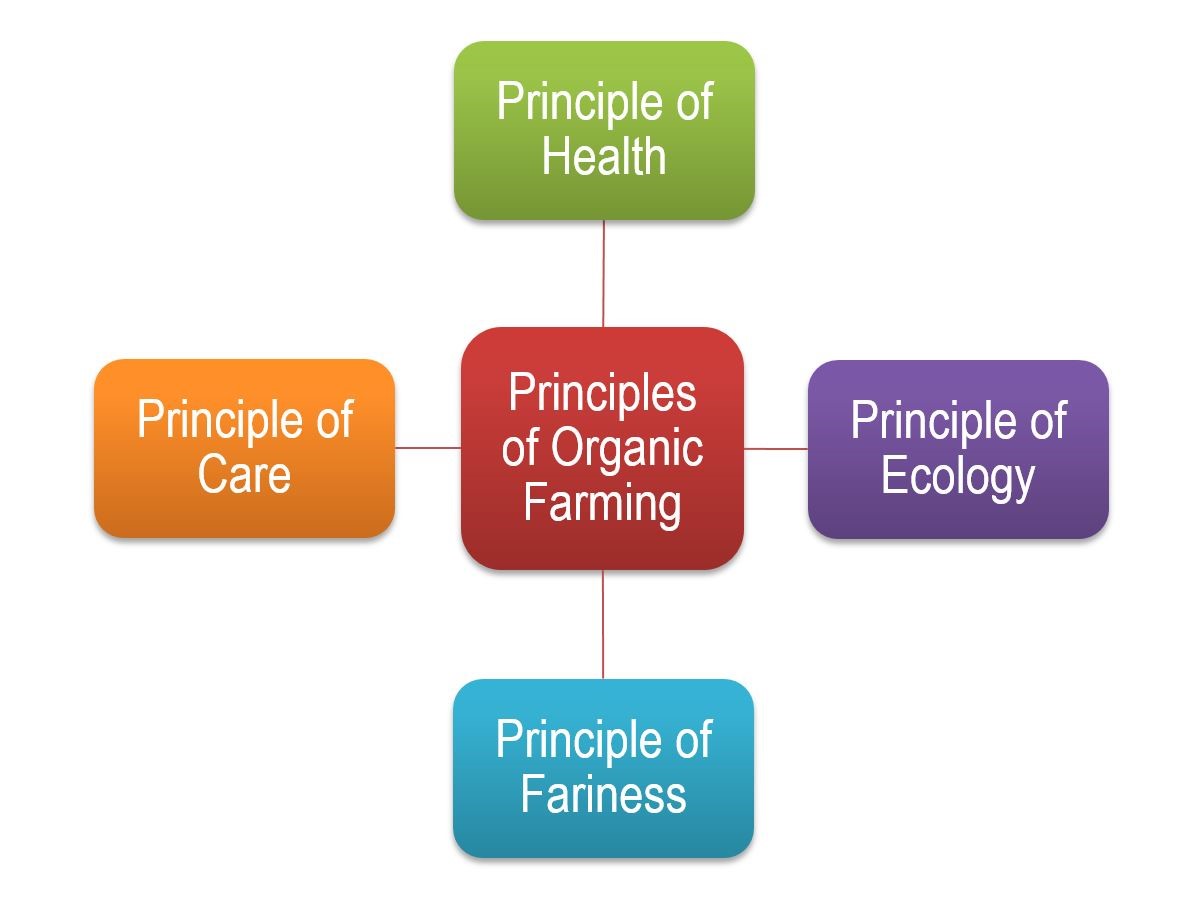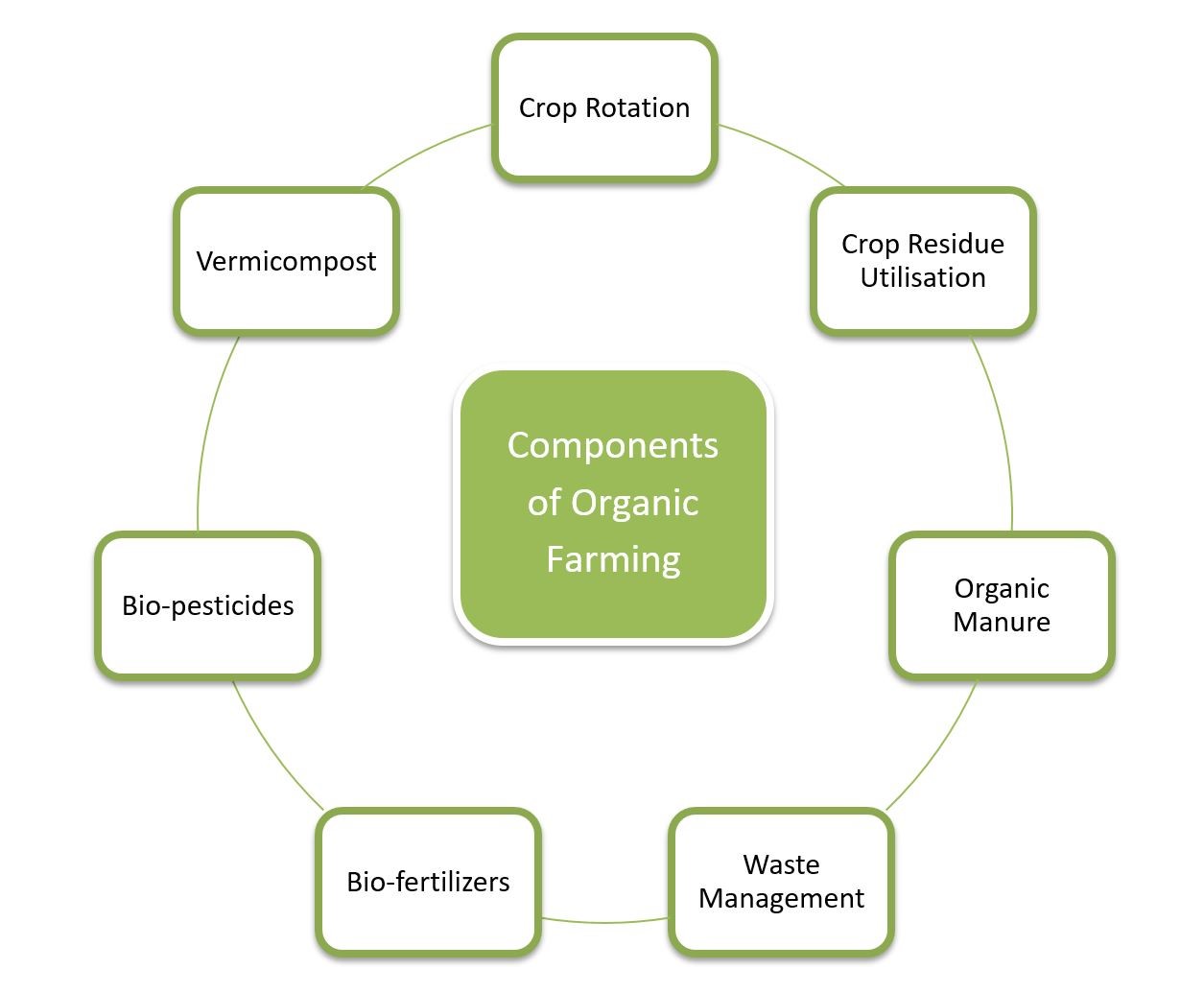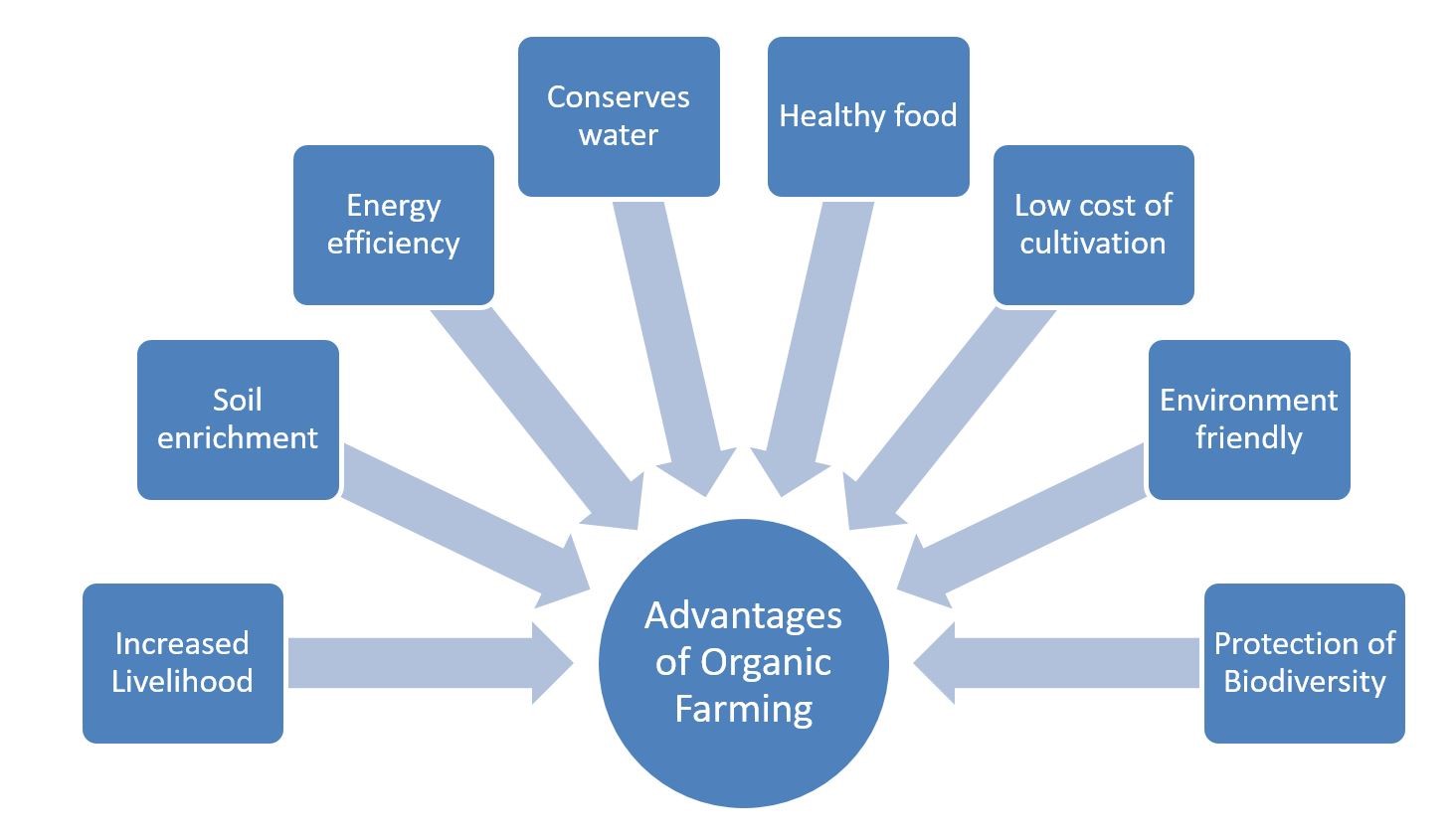My title is: Agriculture | Organic Farming
Organic Farming

What is organic farming?
Organic farming (food and livestock production), is based on a system of farming that imitates natural ecosystems that maintain and replenish the fertility of the soil, as well as balance the populations of pest organisms with beneficial organisms in an integrated manner. It is thus a holistic system, designed to optimize the productivity of diverse elements in the agro-ecosystem, including soil organisms, plants, livestock, and human consumers.
By the definition of IFOAM, “Organic agriculture is a production system that sustains the health of soils, ecosystems, and people. It relies on ecological processes, biodiversity and cycles adapted to local conditions, rather than the use of inputs with adverse effects. Organic agriculture combines tradition, innovation, and science to benefit the shared environment and promote fair relationships and good quality of life for all involved."
As per the definition of the USDA study team on organic farming “organic farming is a system Which avoids or largely excludes the use of synthetic inputs (such as fertilizers, pesticides, hormones, feed additives, etc) and to the maximum extent feasible rely upon crop rotations, crop residues, animal manures, off-farm organic waste, mineral grade rock additives and biological system of nutrient mobilization and plant protection”.
In another definition, FAO suggested that "Organic agriculture is a unique production management system which promotes and enhances agro-ecosystem health, including Biodiversity, biological cycles and soil biological activity, and this is accomplished by using On-farm agronomic, biological and mechanical methods in exclusion of all synthetic off-farm inputs".
What is the need for organic farming?
The success of Green Revolution in increasing food productivity had far reaching consequences on the health of soil and environment. Overuse of chemical fertilizers and pesticides have led to decrease in soil fertility and land degradation, thereby polluting water sources and atmosphere.
Organic farming in this case proved to be totally environment friendly. It reduces the carbon emission by 40 to 60 percent, conserves water and also reduces soil erosion. According to a report, organically grown food has higher content of nutrients as compared to chemically grown food, which can help in reducing malnutrition among women and children.
Due to the rising input cost of farming, farmers risk falling into a debt trap, giving impetus to their search for more sustainable, economical techniques of farming. Both biologically and ethically, organic farming is appearing as a healthier alternative to chemical farming. Consequently, India is growing to be an important supplier of organic food to the world. India is ranked at the 8th position with 1.78 million hectares of land under organic farming which is 2.55% of the world’s total organic agricultural land.
Principles and Components of organic farming
Key principles of organic farming are:
- Principle of health: The health of an individual and community are related to the health of an ecosystem i.e. healthy soil will produce healthy food that will further improve the health of people and animals consuming it.
- Principle of ecology: The organic farming should maintain ecological balance through maintenance of biological diversity, conservation of habitats, etc.
- Principle of fairness: All the stakeholders of organic farming i.e. farmers, works, processors, distributors, etc. should ensure fairness at all the levels. The aim should be to provide good quality food and elimination of hunger and poverty.
- Principle of care: Care for people and environment both should be the priority in Organic farming, the technological solutions and decisions should not affect the health and well-being of the people and ecosystem.

Key components of organic farming are:
- Crop rotation: To optimally manage fertility and care of any fixed area of land, mixed cropping, pasture, and livestock system applied in the rotation is advocated. Eg. Legumes being mandated as 30-50% of land in rotation, helps optimize land fertility and avoids over-straining it.
- Crop residue utilization: 50% of crop residue being utilized as animal feed helps the economics of farm operations in a sustainable manner.
- Organic manure: Manure derived from animal & human sources augments beneficial soil microorganisms by enhancing the bio-availability of nutrients.
- Waste management: Efficient waste management by the usage of industrial, municipal and sewage waste for fertilizers helps the economics of organic agriculture at a systemic level.
- Bio-fertilizers: These contain microorganisms which convert nutrients from non-usable forms to more bioavailable forms, and are less expensive and more ecofriendly than inorganic fertilizers
- Bio-pesticides: These are natural plant products that include alkaloids, terpenoids, and phenolics, also called botanical insecticides. Their activity in protecting plants against insects, nematodes, and fungi is well proven.
- Vermicomposts: Organic manure produced by earthworm activity generates compost of much higher nutrient value than average manure. The application of vermicomposts facilitates easy nutrient availability to plants.

Advantages of Organic Farming
- Lower overall cost of food cultivation: The principles of organic farming involving a balance in water usage, controlling expenditure on energy and recycling waste, helps optimize the cost of food cultivation.
- Enhanced soil nourishment: Even damaged soil prone to erosion and salinity can be restored by the careful administration of micronutrients via crop rotation and green manure, thereby sustaining soil quality for longer.
- Higher energy efficiency: Organic agricultural practices require up to 25 to 30 % less energy consumption compared to conventional agriculture.
- Reduced water pollution: Conventional agriculture results in leaching of up to 60% more nitrates into groundwater, compared to organic farming.
- Environment- friendly practices: Green pesticides such as neem help in maintaining plant health without toxic side effects. The biodiversity of organic farms builds resilience to climate change and unpredictable weather, reducing soil erosion by wind and water, as well as by overgrazing.
- Employment for rural poor: The labor intensive nature of organic farming compared to mechanized farming helps provide employment for rural poor in India’s villages.
- Nutritious, toxin-free, tastier and longer-preserving food: The elimination of toxic and artificial chemicals at various levels in the food chain, right from the soil, fertilization and cultivation to pest control and harvesting, results in naturally nourished plants with superior cellular and structural integrity. This reaps benefits by way of better tasting, contamination-free, longer-lasting food with lower susceptibility to molds and rotting.
- Protection of Biodiversity: Organic farming uses biodiversity and conserves it at all levels.

Key Challenges in promoting Organic Farming
- Lower productivity per unit of farmland: While organic farming is sustainable at an ecosystem macro level, the short term comparison on the basis of each unit of farmland shows evidence of relatively lower yield per unit by organic methods.
- Skill-intensive: Organic farming requires farmers to have greater understanding and monitoring of crops since in principle it eschews resorting to quick fixes of pesticides or herbicides.
- Time-consuming: Organic fertilizers tend to be slow-release and require a long term horizon to realize the benefits of improved soil fertility. Moreover, significant time, energy and effort are required to execute the strict requirements mandated for a farm to qualify as organic.
- Labor intensive: Due to the reduced role of mechanization and higher human intervention, organic farming is in principle highly labor-intensive, which can be a challenge in situations of irregular labor availability or migrating labor.
- Inadequate Quality Standards: Majority of the farmers fail to produce desired quality of organic food due to lack of awareness of market standards.
- Limited availability of Organic Food products: There are less number of retail shops that supply organic food products. There are many fake products in the market that are tagged as organic thereby reducing the profits of genuine vendors.
- Inadequate Market Research: Due to the limited availability of funds and support with regard to market research, most of the farmers use outdated techniques for the cultivation.
Some key issues that are hindering the growth of organic farming in India are as follows:
- Supply chain issues: Organic products requiring separate refrigeration and storage from conventional products to avoid cross-contamination, the lack of refrigerated vehicles and weak links in cold chain logistics are making it difficult for organic farmers to geographically access markets.
- Regulatory issues: Organic farmers in India can earn their highest profits only if they can access international markets, which is currently restricted by regulation.
- Transition issues: As farmers convert their land from chemical/mechanized agriculture to organic agriculture, the withdrawal of chemical inputs and high yielding varieties of seeds causes a drop in yields in the transition phase, which, while subsidized by the government in other countries, has no such subsidy in India.
- Input issues: organic farming in India is hindered by a serious shortage of quality inputs by way of fertilizers and seeds, further complicated by counterfeit or spurious products.
- Awareness issues: In Indian as well as global markets, there are many conflicting ideas on what ‘organic' means.
- Policy issues: The biggest challenge being faced by organic farmers in India is the fact that it is impossible to distinguish an organic product from a chemical agriculture product in the absence of regulation on a labeling standard for organic production, and in absence of a logo for it. The absence of policy makes it difficult to identify and penalize fraudulent sources, while the process being a voluntary certification the punishment cannot be enforced by the government.
Conclusion
The essence of organic farming is agriculture in harmony with nature. However, it is a long-term process, of long gestation time and long term returns in holistic, measurable yet often intangible terms, rather than immediate yields in any tangibly commercial terms.
While the market dynamics of demand and supply are gradually shifting worldwide to appreciate the benefits of organic farming, it is imperative for the government in India to recognize the challenges being faced in organic agriculture at every level, and address these issues in a timely and effective manner, such that the potential benefits may be ultimately realized. Moreover, India will be able to achieve SDG-2 (sustainable agriculture to achieve food security and ensure nutrition), SDG- 5 (Gender Equality), SDG-6 (Clean Water and Sanitation), SDG-7 (Affordable and Clean Energy), SDG-12 (Responsible Consumption and Production), SDG-13 (Climate Action) and SDG-15 (Life on Land) through the promotion of organic farming nationwide.
Popular Blogs
Popular Articles
